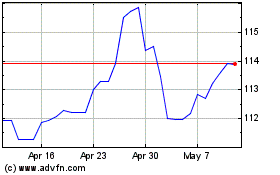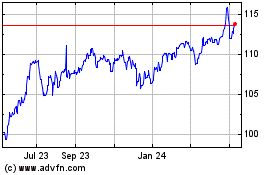Yen Rises On Japan GDP, Rising Risk Aversion
March 07 2017 - 7:30PM
RTTF2
The Japanese yen strengthened against the other major currencies
in the Asian session on Wednesday, after data showed that the
Japanese economy expanded faster than previously expected in the
fourth quarter. The negative cues from Wall Street and rising
geopolitical tensions in the region also triggered safe-haven
buying.
Data from the Cabinet Office showed that Japan's gross domestic
product expanded 0.3 percent on quarter in the fourth quarter of
2016. That missed forecasts for an increase of 0.4 percent, but was
up from last month's preliminary reading of 0.2 percent. GDP gained
0.3 percent in the third quarter.
On a yearly basis, GDP was revised up to 1.2 percent from 1.0
percent, although that also missed forecasts for 1.5 percent.
The Ministry of Finance said that Japan had a current account
surplus of 65.5 billion yen in January, down 88.9 percent on year.
The headline figure was shy of forecasts for a surplus of 270.0
billion yen and down from 1,112.2 billion yen in December.
The trade balance showed a deficit of 853.4 billion yen, missing
expectations for a shortfall of 800.2 billion yen following the
806.8 billion yen surplus in the previous month.
The Bank of Japan said that overall bank lending in Japan was up
2.8 percent on year in February, coming in at 510.808 trillion yen.
That follows the 2.5 percent increase in January.
Tuesday, the yen showed mixed trading against its major rivals.
While the yen rose against the pound and the Swiss franc, it fell
against the U.S. dollar. Against the euro, the yen held steady.
In the Asian trading, the yen rose to nearly a 4-month high of
79.09 against the NZ dollar and a 1-month high of 138.68 against
the pound, from yesterday's closing quotes of 79.26 and 139.07,
respectively. If the yen extends its uptrend, it is likely to find
resistance around 78.00 against the kiwi and 136.00 against the
pound.
Against the euro and the U.S. dollar, the yen advanced to a
5-day high of 120.02 and a 2-day high of 113.61 from yesterday's
closing quotes of 120.41 and 113.98, respectively. The yen may test
resistance around 119.00 against the euro and 111.00 against the
greenback.
Against the Swiss franc and the Canadian dollar, the yen climbed
to 1-week highs of 112.08 and 84.74 from yesterday's closing quotes
of 112.47 and 84.98, respectively. The yen is likely to find
resistance around 111.00 against the franc and 83.00 against the
loonie.
Looking ahead, the German industrial production for January is
due to be released in the pre-European session at 2:00 am ET.
Swiss CPI data for February is slated for release at 3:15 am
ET.
In the New York session, Canada housing starts for February and
building permits for January, U.S. ADP non-farm employment data for
February, wholesale inventories for January and crude oil
inventories data are set to be announced.
CAD vs Yen (FX:CADJPY)
Forex Chart
From Mar 2024 to Apr 2024

CAD vs Yen (FX:CADJPY)
Forex Chart
From Apr 2023 to Apr 2024
